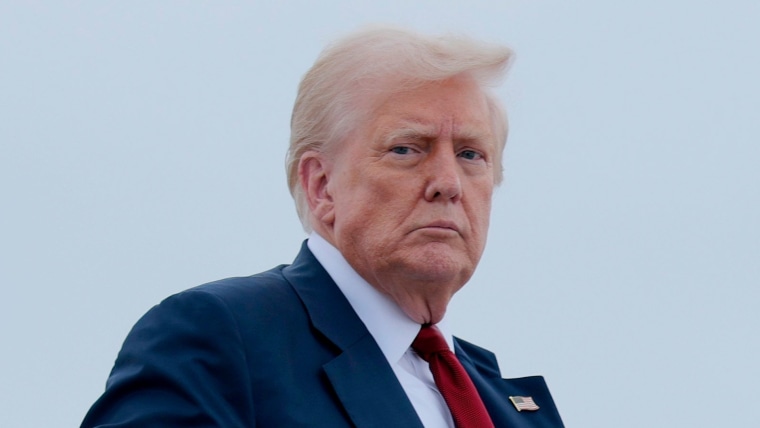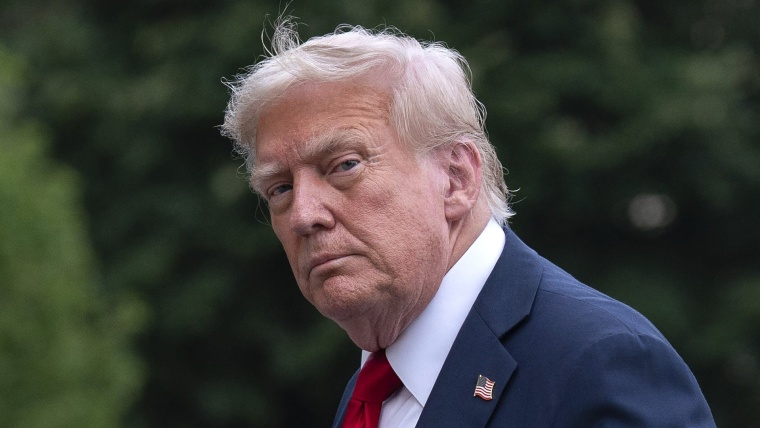Trump fires BLS commissioner after weak jobs report

President Donald Trump on Friday ordered the firing of the head of the Bureau of Labor Statistics, hours after a stunning government report showed that hiring had slowed down significantly over the past three months.
Taking to Truth Social, he attacked Erika McEntarfer, the commissioner of the BLS. He claimed that the country’s jobs reports “are being produced by Biden appointee” and ordered his administration to terminate her.
“We need accurate Jobs Numbers,” Trump wrote. “She will be replaced with someone much more competent and qualified. Important numbers like this must be fair and accurate, they can’t be manipulated for political purposes.”
He intensified his attack in a later post, writing: “In my opinion, today’s Jobs Numbers were RIGGED in order to make the Republicans, and ME, look bad.” He didn’t cite any evidence for his claim.
The BLS on Friday morning reported that the U.S. economy added just 73,000 jobs in July, well below estimates. It also said it had revised the May and June numbers and they turned out to be lower than previously announced by more than 200,000 jobs.
An administration official told NBC News that McEntarfer had indeed been fired.

The firing sent shockwaves through Washington, which has already been rattled by waves of terminations through the nearly seven months of Trump’s second administration.
“President Trump is once again destroying the credibility of our government by firing expert and nonpartisan officials because he does not like the facts that they present,” said Max Stier, the CEO of the non-partisan Partnership for Public Service. “Governments that go down this path find themselves in ugly territory very quickly.”
The deputy commissioner of BLS, Bill Wiatrowski, who took up the role during the Obama administration, will become the acting chief “during the search for a replacement,” Labor Secretary Lori Chavez-DeRemer said.
Julie Hatch Maxfield, the official who oversees the office that produces the employment report, joined the agency during Trump’s first term.
McEntarfer didn’t immediately respond to a request for comment.
President Joe Biden nominated McEntarfer in July 2023 and was confirmed by the Senate in an 86-to-8 vote (with six members not voting) in January 2024. She received overwhelming bipartisan support in the vote.
Vice President JD Vance was among the Republicans who voted to confirm her.
William Martin, communications director to Vance, said the vice president stands by the president’s decision.
“Vice President Vance is completely aligned with President Trump and was glad to see him dismiss the BLS commissioner,” Martin said. “The only thing his confirmation vote indicates is that he was at times willing to let nominations move forward even when he disagreed with them. President Trump has the right to hire and fire the people he wants to staff the government he was elected in a landslide to run, and it’s high time the leftwing activists in the mainstream media recognize that simple fact.”
McEntarfer has spent much of her career in the federal government. Throughout the last 20 years, she has worked in the Census Bureau, Treasury Department and on the White House’s Council of Economic Advisers.
Trump claimed without evidence that the commissioner “faked the Jobs Numbers before the Election to try and boost Kamala’s chances of Victory.”
Former Labor Department officials slammed Trump’s decision to fire McEntarfer.
“The work is done largely by expert career staff who do their jobs with care and pride,” Julie Su, who worked as Labor secretary during the Biden administration, told NBC News. “Career staff who have also been attacked and vilified by this president.”
The BLS routinely revises economic data such as the jobs report, GDP figures and inflation data. Due to the scale of the U.S. economy and response rates to BLS surveys, there can often be lags in data collection. But that lag does not imply any wrongdoing or manipulation.
“Nobody is faking numbers,” former Labor Department chief of staff Daniel Koh wrote on X. “Revisions happen all the time.”
Trump has previously praised the BLS reports, when they were favorable to his administration in April, May and June.
In May, the White House said that April’s jobs report “proved” that Trump was “revitalizing” the economy. In June, Trump posted, “GREAT JOBS NUMBERS” on Truth Social.
In March, standing in the Oval Office, Trump brought up “how good some of these numbers are.”
The politicization of economic data and potential interference with it by political appointees is something that’s typically seen in nondemocratic countries like Russia, Venezuela or China.
Labor Secretary Chavez-DeRemer said after the firing, “our jobs numbers must be fair, accurate, and never manipulated for political purposes.”
Any erosion of trustworthy data can impact businesses, consumers, lending and policymakers. Historically, the United States’ economic data has been considered the gold standard due to the independence typically given to agencies that collect it.
The agency surveys U.S. businesses and consumers by contacting them online, by mail, through phone calls and in-person visits. It uses responses received through those methods to generate reports for the public and government decision-makers.
The Bureau of Labor Statistics is the primary agency that collects information about the nation’s labor markets and economy.
In its mission statement, the agency says that it “measures labor market activity, working conditions, price changes, and productivity in the U.S. economy to support public and private decision making.”
The accuracy of government data collection has also been in question due to sweeping government job cuts.
Last August, the BLS said 818,000 fewer jobs had been created over a 12-month period than initially thought.
At the same time, Trump, who recently resumed attacking Fed Chair Jerome Powell, said that the central bank chief “should also be put ‘out to pasture.'”
Trump has repeatedly pressured Powell to lower interest rates. But the Fed chair has said there’s still “a long way to go to really understand” what the effects of the president’s tariffs will be.
“If you move too soon, you wind up maybe not getting inflation all the way fixed and you have to come back. That’s inefficient. If you move too late, you might do unnecessary damage to the labor market,” Powell said on Wednesday.





